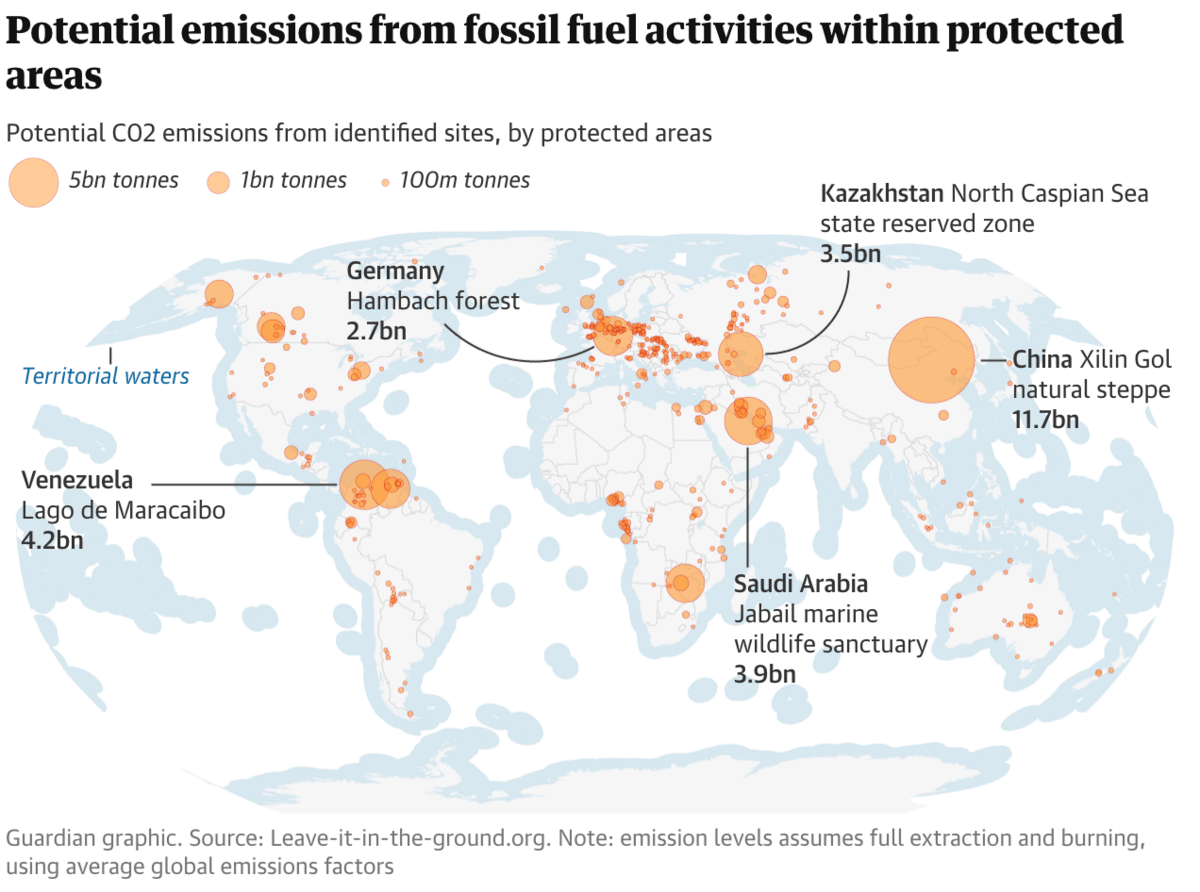In today’s edition:
⚡️ Biden’s plans for slashing emissions
🚜 Commercial boost for lab-grown meat
🌳 Fossil fuel sites in protected areas
Forwarded on this email by a friend?
⚡️ Energy (1-minute read)
Biden’s new plans for cutting emissions
What happened? The Biden administration unveiled a sweeping plan to slash greenhouse gas emissions from the U.S. power industry. Limiting how much carbon dioxide power plants (responsible for more than a quarter of U.S. emissions) can emit.
How will it work? The limits are complex and vary depending on the type of power plant, how it is used, and when it is scheduled to retire. But, they could encourage the widespread adoption of technologies like carbon capture and sequestration (CCS), low-emission hydrogen, or renewable energy.
Impact? EPA projects the plan would cut carbon emissions equivalent to the annual emissions of 137 million passenger vehicles between 2028 and 2042. They also project an estimated $10 billion spend on climate technologies to comply with the new rules but add that new subsidies will be available in the Inflation Reduction Act,
⚡️ Energy Deals:
1) Obeo Biogas raised $2.2M in seed funding for their renewable energy solutions for dairy farmers, converting farm manure into renewable natural gas through anaerobic digestion.
2) Voltfang raised $5.5M in seed for their sustainable battery storage solutions for industry, using vehicles' second-life batteries. Their modular storage systems can be used on-grid, off-grid, or as backup power.
🚜 AgriTech (1-minute read)
China approves first gene-edited crop
The Chinese government has granted approval for developing a gene-edited soybean, increasing the level of oleic acid (a healthy fat) in the plant. Approval of the gene-edited soybean is expected to boost food production in China amid trade tensions, erratic weather, and the ongoing Ukrainian war threatening to disrupt the food supply within the country. Shandong Shunfeng Biotechnology Co, the company doing the gene-editing process, claim to be the first company looking at commercialising gene-edited crops within the country and is researching around 20 other crops for editing — including high-yielding rice, wheat and corn.
Gene-editing, not genetic modification: Gene-editing is considered the less risky approach, as it alters genes rather than introducing foreign ones, and is becoming popular in other Asian nations — Japan has approved gene-edited healthier tomatoes and faster-growing fish.
Mosa Meats opens new facility aiming for price parity with conventional meat
Ten years after it unveiled the world’s first beef burger made from cells grown outside of an animal, Mosa Meats is opening a 30,000 ft “scale up plant” to support its commercialisation plans as they aim to make cultured meat price competitive with conventional meat. Mosa Meat’s process proliferates muscle and fat cells in a lab, which then differentiate into muscle and fat tissue to provide the nutrition, flavour, and texture consumers expect from conventional meat without the environmental consequences of farming. The plant will initially have the capacity to make tens of thousands of cultivated burgers as the company continues to talk with regulators across multiple countries, with Singapore expected to be the first market for Mosa Meats to launch.
🚜 Agri Deals:
1) Fermify raised $5M in seed to address the issue of large-scale milk protein production by domesticating microorganisms and building a fully automated production platform.
2) Improvin raised $3.8M in seed for its platform that assists food brands, processors, and mills in measuring, verifying, and reporting emissions resulting from their primary production activities.
🌳 Nature (1-minute read)
UK tops list for fossil fuel sites in nature-protected areas
What’s happened: A report revealed that fossil fuel extraction and exploration are taking place at almost 3,000 sites in protected areas around the world, with the UK having the highest number of fossil fuel sites in protected areas.
Details: Affected areas include marine protected areas in the UK, the Arctic national wildlife refuge in the US, Canada’s Rocky Mountains parks, and the Coongie Lakes in South Australia. China’s Xilin Gol natural steppe protected area and the Jubail marine wildlife sanctuary in Saudi Arabia
Avoiding carbon tunnel vision: As we decarbonise our energy system, we must focus on more than carbon emission. We must seek to understand better the impact of energy projects on wildlife mortality, habitat loss and fragmentation, noise and light pollution, and invasive species.

🌳 Nature Deals:
1) Ocell raised $5M in seed for their aerial imaging and farm mapping services intended to process optimizations in the industrial forest and farming sector.
💭 Little Bytes
Quote: “The UK’s strong competitive advantages in clean energy generation mean it is uniquely well positioned in the race to net-zero, which can deliver significant and sustained economic growth” — A new report produced for the UK Business Council for Sustainable Development.
Stat: 90% of countries have national biodiversity targets, but only a third are on track to achieve them
Watch: Jellyfish robot which cleans up the ocean
🗞 In other news…
BNP Paribas (BNPP.PA), France's largest lender, will no longer provide any financing dedicated to the development of new oil and gas fields, the bank said on Thursday, as it reiterated its target of an 80% cut of its oil exploration financing by 2030.
El Nino weather system threatens to slash Thai rice crops and spur inflation across Asia, with farmers asked to grow one crop this year instead of two.
“Forest” of vending machines that suck down carbon dioxide planned in Japan to cut carbon emissions.
The UK water regulator, Ofwat, to allocate £40mn to support green projects, including UK’s first full-scale carbon-neutral wastewater works.
🎣 Gone Phishing
Three of these stories are true, one we've made up. Guess which:
US man invents beer-powered motorcycle
A salamander thought to be the first pollen-spreading amphibian
Person breaks record for the longest time living underwater
Crime-fighting cows help police catch suspect
📩 Submit deals, announcements, events & opportunities, or general curiosities for the newsletter here.
